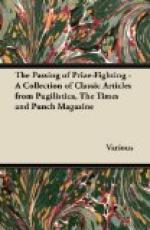“Omnis Gallia in tres partes divisa est.” Is it fanciful to say of the three parts into which all Gaul is divided that by their colours may they be known, the blue, the brown and the ghastly, ghoulish, intolerable, bestial, but, thank God, passing, grey? Yes, thank God, the blight of greyness cannot last long; even now the scabrous plague is being burnt up and swept back and overwhelmed by the resistless flood, eager yet cautious, persistent yet fiery, of the blue and the brown. Hideous, pitiable, soul-searing are the scars that it leaves in its mephitic wake, but the cleansing tide of the brown and the blue sweeps on, and the healing wand of time waves over them, and soon the shell-holes and the waste places and the abominations of desolation are covered with little flowers—or would be if it were Spring.
The Spring! No one knows what depth of meaning lies in that little word for our brave fellows, what intensity of hopes and fears and well-nigh intolerable yearnings it awakens beneath the cheery insouciance of their exteriors; no one, that is, except me. They tell me about it as they pass back, privates and generals, war-hardened veterans and boys of nineteen with the youth in their eyes not yet drowned by the ever-increasing encroachments of the war-devil; all are alike in their cheerful determination to see this grim and bloody business of fighting to an honourable end, and alike, too, in that their souls turn frankly, as might children’s, for refreshment and relief to the kindly breast and simple beauties of Mother Nature.
The key-note of their attitude is given in the sentence, spoken dreamily and as if in forgetfulness of my presence, by a Corporal of the R.G.A. as I cleaned his boots—it was an honour. “The blue—the blue—the blue—and the white!”
He was gazing skywards. I could see nothing but grey clouds, but I knew that his young eyes were keener than mine, that he had learnt to look into the inmost heart of things in that baptism of fire, that travail of freedom, where desolation blossoms and hell sprouts like a weed. Through the grey he could discern the triumph of the blue and the white of peace, when the work of the brown shall be done. It was an allegory. More he told me, too, in his simple country speech, so good to hear in a foreign land: of the daisies in the yard at home, of the dandelions on the lawn, of his pet pig: things too sacred to repeat here. And he told me that the great event on the Front now is the Autumn glory of the trees. Then he departed, and as he went he broke into deep-throated, Homeric laughter, and I—I understood: he was mocking Death. Even thus does laughter yap at the heels of that dishonoured king out here.
* * * * *
TO THE BOOD.
A SODDET.
[Our poet has caught a severe
cold through
having spent the night
in the cellar.]
BOOD, whose autubdal spleddour, as of
dood,
Shides od frob set of sud to dawdigg
bord,
Gradt be this bood, o bood, to calb by
bood
With agodisigg apprehedsiod tord,




